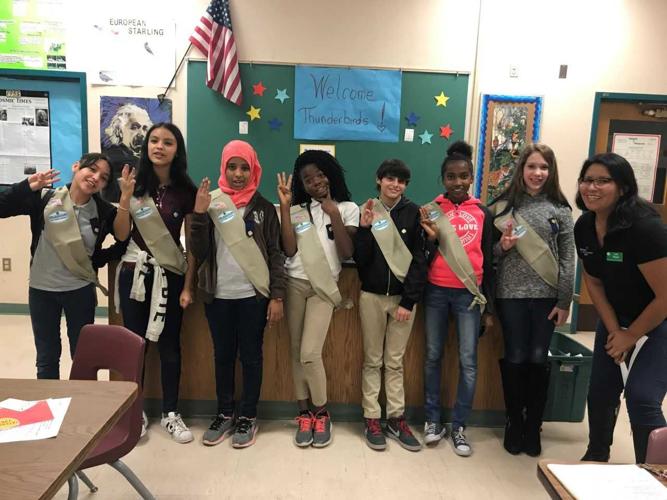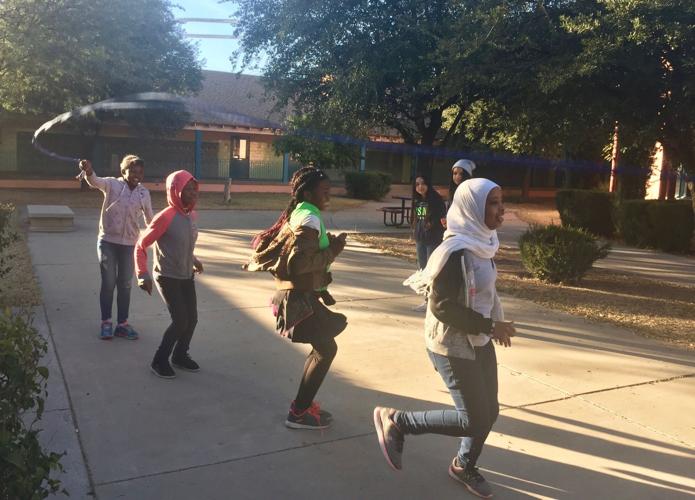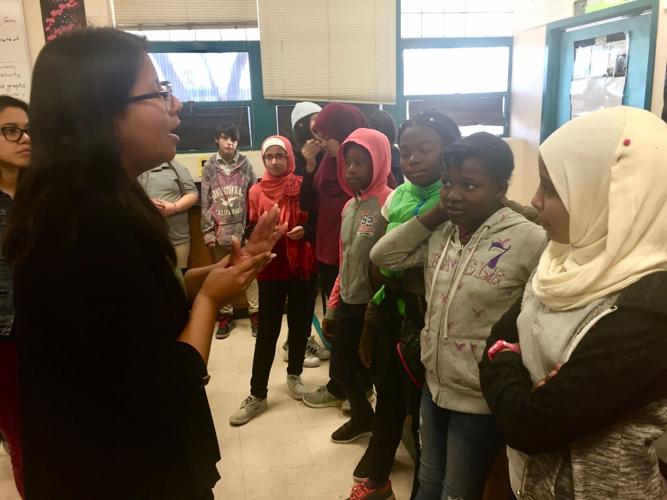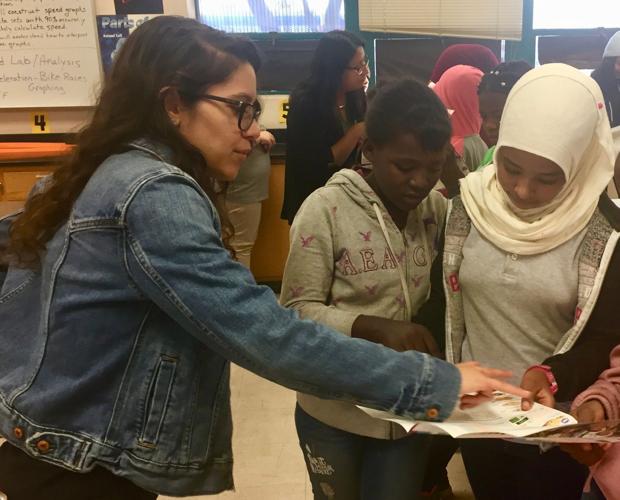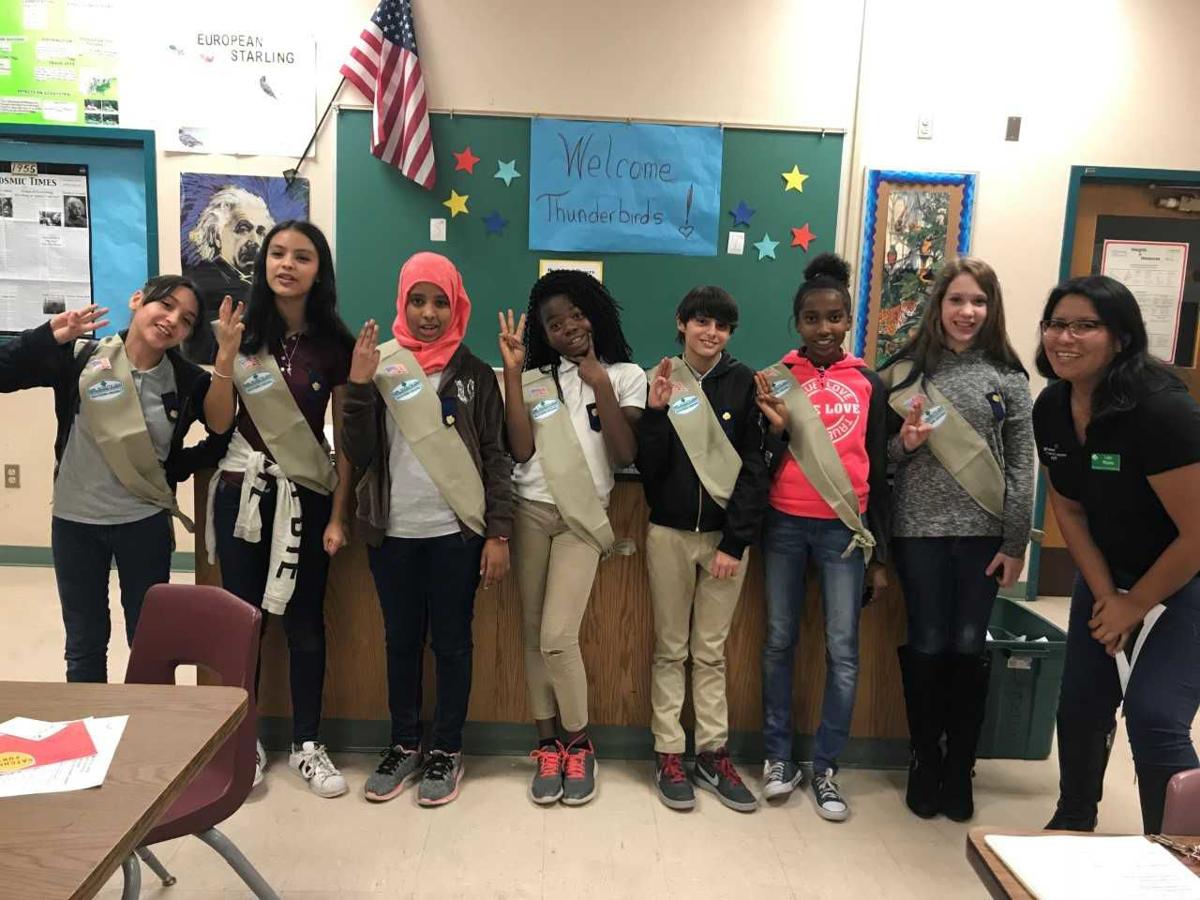When Xitlaly Reyes talks to the Girl Scouts at Doolen Middle School, she sets off a flurry of chatter.
Girls translate for each other, speaking Spanish, Arabic and Tigrinya, a language spoken by several girls from Eritrea.
For Reyes, the troop's co-leader, it took some getting used to.
About a dozen middle school girls join Reyes and the other leader Camille Gonzalez after school on Thursdays.
Last week, girls hopped from one side of a jump rope to the other, depending on whether they agreed with a certain statement.
For example: "I had a good day at school today" or "I have lived in more than one country." The latter question set off another spurt of whispers, with girls for Eritrea or Syria waving uncertain peers to the "agree" side of the rope.
This is a new troop for the Girl Scouts of Southern Arizona, born last fall out a multi-week SciGirls program at the school. Originally an after-school STEM (science, technology, engineering and mathematics) experience funded by a National Science Foundation grant, the girls' interest compelled local Girl Scout leaders to turn the group into a troop, Reyes said. What began as after-school science experiments is blossoming into a small community.

Xitlaly Reyes, the outdoor programs specialist for Girl Scouts of Southern Arizona, explains to Doolen Middle School girls how cookie season works.
"We realized that the girls were having a lot of fun being part of the Girl Scout community, so we invited them to a mining badge day," Reyes said. "I was prepared to have half of them attend, six or seven, and I show up that morning with an 11-passenger van, and there are 14 girls signed up to go, waiting for me in the parking lot to go do a tour of a mine."
That was in November 2017. The Doolen troop joined about nine other schools with staff-led troops that meet after school on campus. Right now, Doolen, 2400 N. Country Club Road, is the only middle school troop, said Reyes, an outdoor programs specialist.
"When you're talking about middle school, you're entering adolescence and are more aware of your surroundings and self, and everyone is at a different level of development," said co-leader Gonzalez, a Girl Scouts program facilitator.
The school programs mostly work with low-income schools in areas with inadequate volunteers. Girl Scouts covers the girls' membership fees, Reyes added.
"We feel that Girl Scouts is for every girl, regardless of socioeconomic status or if we have volunteers in that area," said Kaylie Leslie-Larson, the social impact coordinator. "I grew up in Girl Scouts in a low-income area and was fortunate that my mom could do that, but that's not the reality for a lot of girls. We want to foster a community for a future generation of leaders."
At Doolen, like in other school programs, girls have the chance to go to camp, earn badges and sell cookies.

Camille Gonzalez, program facilitator for the Girl Scouts of Southern Arizona, identifies individual cookies for Kisanet Gebreselassie and Muna Hasen.
During the agree/disagree game last Thursday, Reyes tried to gauge her girls' existing knowledge of Girl Scout cookies. Activities that afternoon included acting out scenarios for interacting with customers.
But first, the game morphed into an impromptu jump-rope contest, with two girls swinging the large rope and others skipping in the center. Giggles abounded.

An organized game about likes and dislikes quickly becomes a jump-roping session on a Thursday afternoon at Doolen Middle School Girl Scouts.
Several of the girls in the group prefer Spanish to English. Others came to Tucson as refugees.
Muna Hasen, 13, and Kisanet Gebreselassie, 12, are originally from Eritrea, but spent years in Ethiopia en route to resettlement in Tucson. They both said they want to be doctors someday.
In the last few months, Reyes has seen girls branch out from original friends and those who only speak their first language.
Reyes remembers Muna working with girls who mostly speak Spanish on their digital filmmaking badge. With three languages between them, they managed to make it work.
"I feel like at the end of the day, the girls who need programs like this the most are coming from low-income and high-risk situations..." Gonzalez said. "We're giving them the opportunity to think about their future ... and be confident about who they are."


